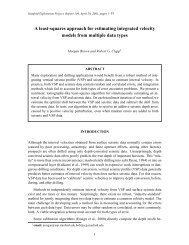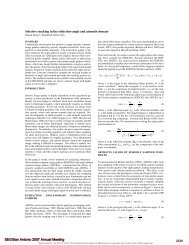The Project Gutenberg Etext of the Iliad of - Stanford Exploration ...
The Project Gutenberg Etext of the Iliad of - Stanford Exploration ...
The Project Gutenberg Etext of the Iliad of - Stanford Exploration ...
You also want an ePaper? Increase the reach of your titles
YUMPU automatically turns print PDFs into web optimized ePapers that Google loves.
38 ILIAD. III. 115–164<br />
down on <strong>the</strong> ground near each o<strong>the</strong>r; and around [each pile <strong>of</strong> arms] <strong>the</strong>re was<br />
a little space.<br />
But Hector dispatched two heralds to <strong>the</strong> city with speed to bring <strong>the</strong> lambs,<br />
and to call Priam. While, on <strong>the</strong> o<strong>the</strong>r hand, king Agamemnon sent Talthybius<br />
to go to <strong>the</strong> hollow ships, and ordered him to bring a lamb. And he did not<br />
disobey noble Agamemnon.<br />
And meantime came Iris a messenger to white-armed Helen, likening herself<br />
to her husband’s sister, <strong>the</strong> wife <strong>of</strong> Antenor’s son, most excelling in beauty<br />
<strong>of</strong> <strong>the</strong> daughters <strong>of</strong> Priam, Laodice, whom <strong>the</strong> son <strong>of</strong> Antenor, king Helicaon,<br />
possessed. But she found her in her palace, and she was weaving an ample web,<br />
a double [mantle], 1 resplendent, and on it was working many labors both <strong>of</strong> <strong>the</strong><br />
horse-taming Trojans and <strong>the</strong> brazen-mailed Greeks, which on her account <strong>the</strong>y<br />
suffered at <strong>the</strong> hand <strong>of</strong> Mars. Standing near, <strong>the</strong> swift-footed Iris accosted her<br />
thus:<br />
“Come hi<strong>the</strong>r, dear lady, 2 that thou mayest view <strong>the</strong> wondrous deeds <strong>of</strong> <strong>the</strong><br />
horse-taming Trojans, and <strong>of</strong> <strong>the</strong> brazen-mailed Greeks, who formerly against<br />
each o<strong>the</strong>r waged tearful war in <strong>the</strong> plain, eager for destructive battle. Now,<br />
however, <strong>the</strong>y sit in silence (and <strong>the</strong> war has ceased), leaning on <strong>the</strong>ir shields,<br />
and near <strong>the</strong>m <strong>the</strong>ir long spears are fixed. But Alexander and Mars-beloved<br />
Menelaus are about to fight for thy sake with <strong>the</strong>ir long spears, and thou shall<br />
be called <strong>the</strong> dear wife <strong>of</strong> him who conquers.”<br />
Thus having spoken, <strong>the</strong> goddess infused a tender desire into her mind both<br />
<strong>of</strong> her former husband, and <strong>of</strong> her city, and her parents. And instantly vailing<br />
herself in white linen robes, 3 she rushed from her chamber, shedding a tender<br />
tear: not alone, for two domestics accompanied her, Œthra, daughter <strong>of</strong> Pit<strong>the</strong>us,<br />
and large-eyed Clymene. <strong>The</strong>n <strong>the</strong>y quickly came to where <strong>the</strong> Scæan<br />
gates were. But Priam and Panthous, and Thymœtes, Lampus, Clytius, Hicetaon,<br />
an <strong>of</strong>fshoot <strong>of</strong> Mars, Ucalegon, and Antenor, both prudent, elders <strong>of</strong> <strong>the</strong><br />
people, sat at <strong>the</strong> Scæan gates, long since desisting from war, through old age:<br />
but good orators, like unto <strong>the</strong> Cicadæ, 4 which, in <strong>the</strong> woods, sitting on a tree,<br />
send forth a delicate voice; such leaders <strong>of</strong> <strong>the</strong> Trojans at that time were sitting<br />
on <strong>the</strong> tower. But when <strong>the</strong>y saw Helen coming to <strong>the</strong> tower, in low tone <strong>the</strong>y<br />
addressed to each o<strong>the</strong>r winged words:<br />
“It is not a subject for indignation, that Trojans and well-greaved Greeks<br />
endure hardships for a long time on account <strong>of</strong> such a woman. In countenance<br />
she is wondrous like unto <strong>the</strong> immortal goddesses, but even so, although being<br />
such, let her return in <strong>the</strong> ships, nor be left a destruction to us and to our<br />
children hereafter.”<br />
Thus <strong>the</strong>y spoke. But Priam called Helen,—“Coming hi<strong>the</strong>r before us, dear<br />
daughter, sit by me, that thou mayest see thy former husband, thy kindred,<br />
and thy friends—(thou art not at all in fault toward me; <strong>the</strong> gods, in truth,<br />
1By xlaina=n is understood a mantle which could be worn doubled. O<strong>the</strong>rs suppose it<br />
means cloth <strong>of</strong> double tissue.<br />
2An affectionate use <strong>of</strong> <strong>the</strong> word nu/ mfa, which properly means a bride or young wife.<br />
3<strong>The</strong> plural is used to denote a long flowing robe.<br />
4By some <strong>the</strong> cicada or te/ ttic, this is to be considered to be <strong>the</strong> balm-cricket.







